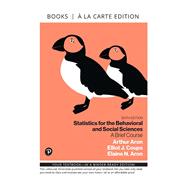NOTE: Before purchasing this MyLab access card with eText, check with your instructor to ensure you select the correct ISBN. Several versions of the MyLab™ and Mastering™ platforms exist for each title, and registrations are not transferable. To register for and use MyLab or Mastering, you may also need a Course ID, which your instructor will provide.
Used books, rentals, and purchases made outside of Pearson
If purchasing or renting from companies other than Pearson, the access codes for the MyLab platform may not be included, may be incorrect, or may be previously redeemed. Check with the seller before completing your purchase.
For one¿-quarter/semester courses that focus on the basics in statistics, or combine statistics with research methods.
Includes MyLab Statistics with eText.
A practical approach that demystifies statistics
Statistics for the Behavioral and Social Sciences, 6th Edition, builds off a unique and well-¿established approach of emphasizing the intuitive, de-emphasizing the mathematical, and explaining everything in direct, simple language. By using definitional formulas to emphasize the concepts of statistics – rather than the rote memorization – learners work problems in a way that keeps them constantly aware of the underlying logic.
In the new edition, Aron, Coups, and Aron maintain the acclaimed hallmark features, while incorporating user feedback, their own teaching experiences, and advances and changes in the field. With a focus on simplifying the exposition, updating the content, and making the book more effective overall, this revision promises to increase reader interest and learning.
Reach every student with MyLab Statistics
MyLab™ is the teaching and learning platform that empowers you to reach every student. By combining trusted author content with digital tools and a flexible platform, MyLab personalizes the learning experience and improves results for each student. With MyLab Statistics and StatCrunch, an integrated web-based statistical software program, students learn the skills they need to interact with data in the real world. Learn more about MyLab Statistics.
9780134877198 MyLab Statistics with Pearson eText -- Standalone Access Card-- Statistics for the Behavioral and Social Sciences: A Brief Course, 6/e











